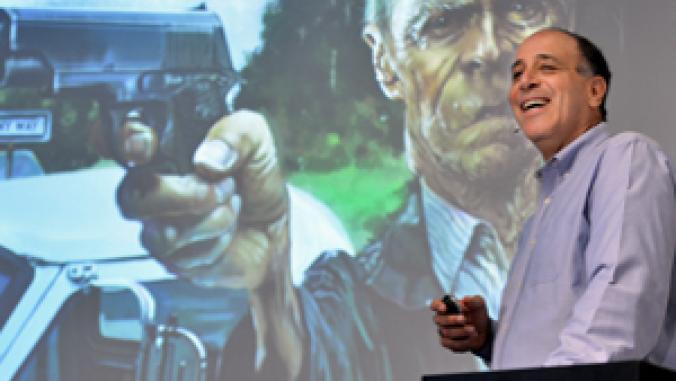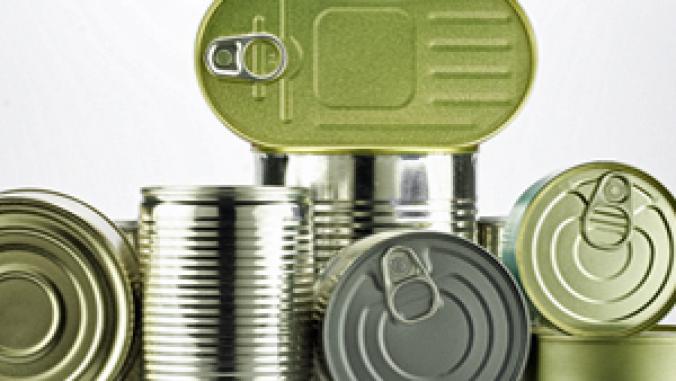How Con-Way Delivers Greener Trucking
<p>Heavy-duty trucks, the workhorses of commerce, are integral to the supply chain of every business. The movement to reduce their impact on the environment is huge. Here's what a major industry player is doing to help.</p>

Unless you're in the trucking industry, Con-way Inc. is likely to be one of those big companies you've heard very little about.
The $5 billion firm is a major player in the freight transportation business and had an important role in the development of the Obama administration's landmark fuel efficiency and greenhouse gas emissions standards for heavy duty trucks (and other large vehicles that haul things or people).
Heavy-duty trucks are the workhorses of commerce, they are integral to the supply chain of every business, and the movement to reduce their impact on the environment is huge.
Con-way joined truck and engine manufacturers, transport firms, scientists and a gaggle of sustainability-focused NGOs in helping the government craft the new regulations. They're expected to save companies as much as $50 billion in fuel costs, cut oil consumption by 530 million barrels and save the planet from 270 million metric tons of greenhouse gas emissions.
Engaging in the effort was an extension of the company's long track record to boost the performance as well as the fuel and cost efficiency of trucks, said Randy Mullett, Con-way's vice president for government relations.
From route management and logistics to operations and vehicle design, Con-way has developed solutions that have improved the way the company does business and bolstered its bottom line. Those improvements have also helped the firm reduce its environmental impacts. And as an EPA SmartWay partner almost since the program's inception, Con-way has joined others in the industry to push practices and strategies that reduce emissions.
A follower of Lean Six Sigma management principles, Con-way's work on sustainability issues is an outgrowth of a business imperative: the need to use energy -- namely fuel -- efficiently.
But that's not something Con-way talks about much outside its circle of industry partners. I caught up with Mullett recently to ask why and to see if he would detail some of Con-way's efforts.
| Con-way Inc. in a Nutshell |
| Business: Freight transportation and logistics. Headquarters: Ann Arbor, Mich. Founded: 1929 Size: $5B in revenue, 28,500 employees worldwide. Reach: 500 locations in 18 countries in North and South America, Asia, Europe and Australia. 3 Main Companies: Con-way Truckload - Provides transportation of full truckloads of goods. EPA SmartWay partner since 2005. Con-way Freight - Provides date-specific, less-than-truckload (LTL) services. SmartWay partner since 2006. Menlo Logistics - International provider of chain solutions. SmartWay partner since 2007. |
He covered a lot of territory in our conversation. Here is his answer to the first question and a summary of what Con-way is doing to shrink its environmental tireprint:
Is Con-way really a quiet company when it comes to sustainability, or were we just not listening?
"We have been very careful to not get out in front of our sustainability initiatives in a way that could be construed as greenwashing. Sustainability is a fast emerging, quickly changing area. We're involved in an industry that uses a lot of energy, and our goal has always been to use that as efficiently as possible. Our leadership had a tough time convincing itself that that was really sustainability as it is being portrayed in the public space by people who like to talk a lot about sustainability.
"A lot of the things we've done have been rather low-tech solutions. Things like turning the speed governors back on the fleet resulted in tremendous savings of both fuel usage and, therefore, greenhouse gas reduction, as well as expense for the company. But we've been very careful to make sure we were erring on the side of conservatism when we were making those claims ... [So] even though the company has traditionally been quiet, we do have a list of things that we're working on that can take us down the sustainability path."
Getting Traction from Low-Tech Solutions
In 2008, Con-way changed the settings for the speed governors on the fleets for its less-than-truckload and full truckload transport businesses. The maximum speed for the Con-way Freight fleet, which consolidates less-than-truckload deliveries, went from 65 mph to 62 mph. The maximum speed possible for the fleet of Con-way Truckload dropped to 65 mph from 70 mph.
"In other words, when the truck hits 65 miles per hour, it just won't go any faster -- it doesn't matter how hard you press on the accelerator," Mullett said. "That simple change [in both fleets] reduced our fuel usage by over 6 million gallons per year."
The move also reduced the company's carbon dioxide emissions by almost 900,000 tons the same year, according to data Con-way provided to the EPA. Other simple practices that reduce fuel consumption and emissions include using tires designed for less rolling resistance and limiting engine idling.
Using Design and Innovation to Improve Fuel Efficiency
• Trailers
"We manufacture our own trailers, and it gives us a great opportunity to do things like make use of lightweight materials for everything that is used in those trailers," said Mullett. Road Systems Inc., a subsidiary of Con-way Inc., is the company's trailer manufacturing division.
"About 60 percent of the trailer is recycled because we can control that when it's turned in and refurbished. We're also able to use low rolling resistance tires and other things that increase the efficiency of the units."
 • Aerodynamic Technology
• Aerodynamic Technology
Con-way Truckload, along with Frito-Lay and PepsiCo, were among the early adopters of Smart Truck UnderTrays (there's one under the trailer to the right), which improve the aerodynamics of trailers. Con-way helped pilot the devices that were introduced last fall.
"Now we're not just piloting free stuff, we're actually purchasing and installing this in the truckload fleet," Mullett said. "We have several hundred of them installed."
Saving Energy, Money and More Fuel in Facilities
• LEED and Lighting
In addition to striving for LEED-certification at key sites -- the firm recently earned a LEED-Gold rating for a facility in Calexico, Calif. -- the company has embarked on a vast relamping project to replace existing lighting with energy-efficient systems at 340 properties. "We've got several hundred facilities with yard lights on, and we're running them 24-hours a day," said Mullett, adding that Con-way keeps tabs on the energy sources for its sites so the company can determine how such upgrades affect the environmental footprint of facilities.
"Depending on the cost of the energy at a facility, the payback is anywhere from six months to about 16 months," Mullett said of the lighting upgrades that will continue to roll out for about two years. "That one little simple change will save us 40 percent on our electric bill, and that's several million dollars." The company also expects a marked reduction in greenhouse gas emissions. "By the time it's all finished, it will be a pretty significant nut," said Mullett.
• Siting Facilities
In trucking, as in real estate, locations are key. Con-way periodically runs simulation models of its freight and hauling systems and uses the results to re-engineer its network of facilities based on where freight is coming from and where it's going.
"In our last iteration of doing that, we were able to close and merge together -- I mean, we didn't lose employees; we just moved facilities and put them together -- we were able to eliminate 40 physical locations, and we saved 124,000 miles a day," Mullett said. "You extend that out by 250 working days, and that was a ton of miles taken out of the system."
Exploring Advanced IT Solutions
While Con-way has realized large savings through low-tech solutions, it also has been quick to test and adopt developments in IT, like the network modeling Mullett described, to make its business run better.
For example, last year at the truckIT Forum, Con-way delivered a talk on how companies can use cloud computing to improve operations end to end. "We do an awful lot with information technology," Mullett said.
IT solutions being explored by the company include:
• Optimization software to direct the trucks to the easiest, most efficient, time-sensitive route based on customer needs, road conditions, available driver hours and available equipment.
• Logistics analytics and modeling that support near-sourcing and development of more efficient supply chains for customers. In the past, Mullett noted, logistics was chiefly a matter of service and price. "You basically had two matrices that you dealt with," Mullett said. "Now you've got service, price, and sustainability." Working with an international consortium, Menlo is working to develop a transportation and supply chain carbon calculator, he said.
• Use of telematics to help drivers find available parking for their trucks while they are in transit. The project with University of Michigan Transportation Research Institute will investigate solutions that will enable drivers to swiftly locate spots that can accommodate their trucks, which would eliminate time spent first locating a facility and then determining whether there's a slot big enough for them.
A Policy Change That Could Drive Greener Trucking
Con-way and others in the industry are pushing for an update of 20-year-old regulations that limit the size and weight of trucks on federal highways in most states.
In the past two decades, "we've had a lot of change in demographics," Mullett said. "We've had a lot of change in how we construct roads. We've had a lot of changes in truck technology and safety technology. But because this rule is in place, we can't even talk about ways we could use more productive vehicles in certain circumstances that would save us a tremendous amount of fuel, wear and tear on our highways, and consequently have a huge green effect."
The problem is that "more productive" basically means larger, and the prospect of bigger trucks hauling more weight on highways is a very tough sell. People tend to think that "bigger" translates to "unsafe." Also, the idea isn't likely to be welcomed by another major player in freight transport: the railroad industry.
Mullett acknowledged the challenges. "Intellectually, [the concept] is very easily understood; emotionally, it's not," he said. "I will harken back to our simple 'reduce the speed a little bit' idea. Look at what kind of impact that had. It's huge. This is one of those things that's not high tech. There's no technological reason we can't do it. There's really no legitimate reason why we can't do it -- it's just the political reason that we can't do it."
3 Reasons Why the Trucking Industry May Have an Easier Drive Toward Sustainability
• Visibility: "First off, people see us every day," Mullett said. "They notice us. We're very visible, and it causes policy makers and the public to pay attention to what's going on in our space. So the energy that surrounds that, I think, has the potential to help us have an advantage over other industries that are more hidden."
• Fuel Reduction is a Business Imperative: "The other thing is, our biggest single expense in the truckload market is fuel -- energy. We have a huge incentive to get better as an industry. Any business where your biggest expense is x, always wants to be x minus something. So there's going to be a lot of emphasis from the industry to do that."
• There's No Silver Bullet, But There Are Far-Reaching Solutions: "The third thing, I think, is there are some really mega-solutions out there that could impact our industry and our fuel usage and efficiency dramatically. Things like the size and weight proposal that's on the table. Even though that's a heavy political lift, there aren't a whole lot of areas where you've got that kind of low-hanging fruit laying out there. Where you can just take a whole huge industry and say, 'Boom. You're 10 percent more efficient tomorrow.' We've got the ability to do that."
Con-way's short list of sustainability efforts turned out to be a pretty long haul. But the company is still shy about telling its sustainability story. One reason is that Con-way views the work as simply being smart about doing business.
The reason offered by Mullett reflects the firm's long history as big but quiet company: "It's not about stuff we're going to do, it's about stuff we're actually doing or have done."





